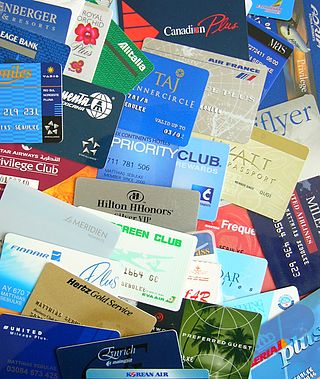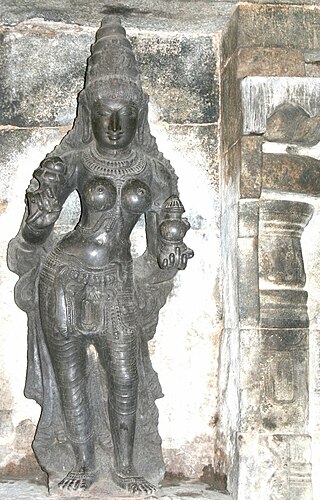
In the ancient Greek myths, ambrosia is the food or drink of the Greek gods, and is often depicted as conferring longevity or immortality upon whoever consumed it. It was brought to the gods in Olympus by doves and served either by Hebe or by Ganymede at the heavenly feast.

A loyalty program is a marketing strategy designed to encourage customers to continue to shop at or use the services of a business associated with the program. A loyalty program typically involves the operator of a particular program set up an account for a customer of a business associated with the scheme, and then issue to the customer a loyalty card which may be a plastic or paper card, visually similar to a credit card, that identifies the cardholder as a participant in the program. Cards may have a barcode or magstripe to more easily allow for scanning, although some are chip cards or proximity cards.

Amrita, Amrit or Amata in Pali, is a Sanskrit word that means "immortality". It is a central concept within Indian religions and is often referred to in ancient Indian texts as an elixir. Its first occurrence is in the Rigveda, where it is considered one of several synonyms for soma, the drink of the devas. Amrita plays a significant role in the Samudra Manthana, and is the cause of the conflict between devas and asuras competing for amrita to obtain immortality.

Squash, is a non-alcoholic beverage with syrup used in beverage making. It is usually fruit-flavoured, made from fruit juice, water, and sugar or a sugar substitute. Modern squashes may also contain food colouring and additional flavouring. Some traditional squashes contain herbal extracts, most notably elderflower and ginger.

Traditional ginger beer is a sweetened and carbonated, usually non-alcoholic beverage. Historically it was produced by the natural fermentation of prepared ginger spice, yeast and sugar.

Minute Maid is an American product line of beverages, usually associated with lemonade or orange juice, but which now extends to soft drinks of different kinds, including Hi-C. Minute Maid is sold under the Cappy brand in Central Europe and under the brand "Моя Семья" in Russia and the Commonwealth of Independent States. Minute Maid was the first company to market frozen orange juice concentrate, allowing it to be distributed throughout the United States and served year-round. The Minute Maid Company is owned by The Coca-Cola Company, the world's largest marketer of fruit juices and drinks. The firm opened its headquarters in Sugar Land Town Square in Sugar Land, Texas, United States, on February 16, 2009; previously it was headquartered in the 2000 St. James Place building in Houston.

Earl Tywone Stevens Sr., better known by his stage name E-40, is an American rapper. He is a founding member of the rap group The Click and the founder of Sick Wid It Records. He has released 26 studio albums to date, appeared on numerous movie soundtracks, and has also done guest appearances on a host of other rap albums. Initially an underground artist, his 1995 solo album In a Major Way opened him up to a wider audience. Beginning in 1998, he began collaborating with mainstream rappers outside the San Francisco Bay Area. He rose to higher mainstream popularity in 2006 with his single "Tell Me When to Go", which was produced by Lil Jon.

Milo is a chocolate-flavoured malted powder product produced by Nestlé, typically mixed with milk, hot water, or both, to produce a beverage. It was originally developed in Australia by Thomas Mayne (1901–1995) in 1934.

Liquor is an alcoholic drink produced by the distillation of grains, fruits, vegetables, or sugar that have already gone through alcoholic fermentation. Other terms for liquor include: spirit, distilled beverage, booze, spirituous liquor or hard liquor. The distillation process concentrates the liquid to increase its alcohol by volume. As liquors contain significantly more alcohol (ethanol) than other alcoholic drinks, they are considered "harder." In North America, the term hard liquor is sometimes used to distinguish distilled alcoholic drinks from non-distilled ones, whereas the term spirits is more commonly used in the UK. Some examples of liquors include vodka, rum, gin, and tequila. Liquors are often aged in barrels, such as for the production of brandy and whiskey, or are infused with flavorings to form flavored liquors, such as absinthe.
Enviga is a Nestea carbonated canned green-tea drink. Enviga is a trademark of Nestlé licensed to Beverage Partners Worldwide, a joint venture between The Coca-Cola Company and Nestlé. It is available in three flavors: Green Tea, Tropical Pomegranate, and Mixed Berry. According to Coca-Cola, Enviga burns 60 to 100 calories per three 12-oz.(330 ml) cans due to its high EGCG and caffeine content. The makers of the drink were sued for making fraudulent health claims about weight loss, and agreed to settle and cease repeating them.
Alcohol most commonly refers to:

Agave syrup, also known as maguey syrup or agave nectar, is a sweetener commercially produced from several species of agave, including Agave tequilana and Agave salmiana. Blue-agave syrup contains 56% fructose as a sugar providing sweetening properties.

Caro is a brand of roasted grain drink, a caffeine-free coffee substitute made of roasted barley, malted barley, chicory, and rye. It is manufactured by Nestlé and was first introduced in West Germany in 1954. It is available throughout Europe as well as other markets including New Zealand and Australia. It is imported to the United States under the name Pero and sold in Spain as Eko.
Grapico is a caffeine-free, artificially flavored carbonated soft drink with a purple color and a grape taste that is sold in the Southeastern United States. When introduced in 1916, the product quickly became a success, which in part was due to implying that Grapico contained real grape juice even though it contained fake juice. In the spring of 1926, J. Grossman's Sons sold the Grapico business to the Pan American Manufacturing Company in New Orleans. Pan American continued J. Grossman's Sons' improper practice of implying that Grapico contained real grape juice and lost the right to use the word "Grapico" to designate their artificial grape drink in 1929.

Juice is a drink made from the extraction or pressing of the natural liquid contained in fruit and vegetables. It can also refer to liquids that are flavored with concentrate or other biological food sources, such as meat or seafood, such as clam juice. Juice is commonly consumed as a beverage or used as an ingredient or flavoring in foods or other beverages, such as smoothies. Juice emerged as a popular beverage choice after the development of pasteurization methods enabled its preservation without using fermentation. The largest fruit juice consumers are New Zealand and Colombia. Fruit juice consumption on average increases with a country's income level.











